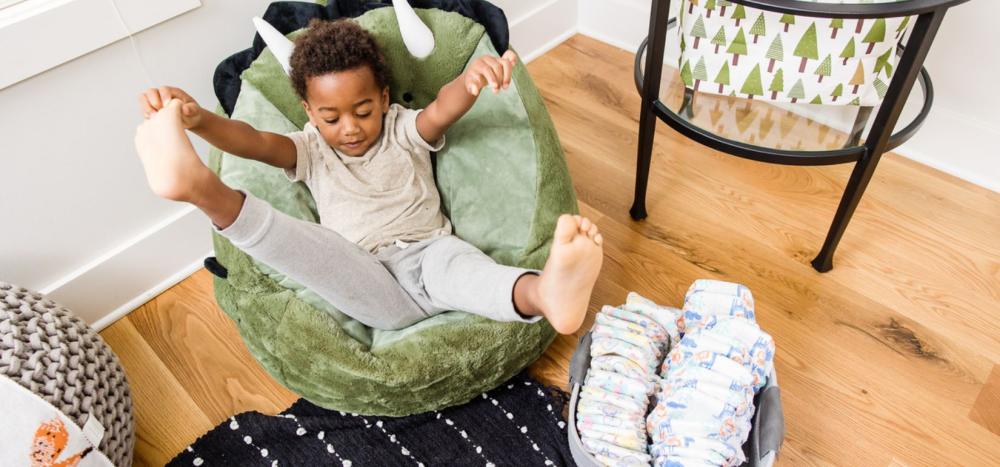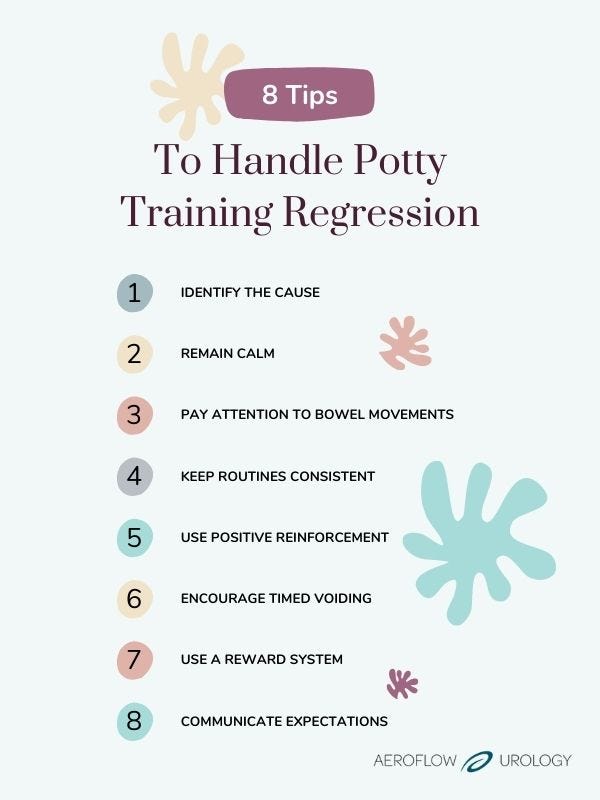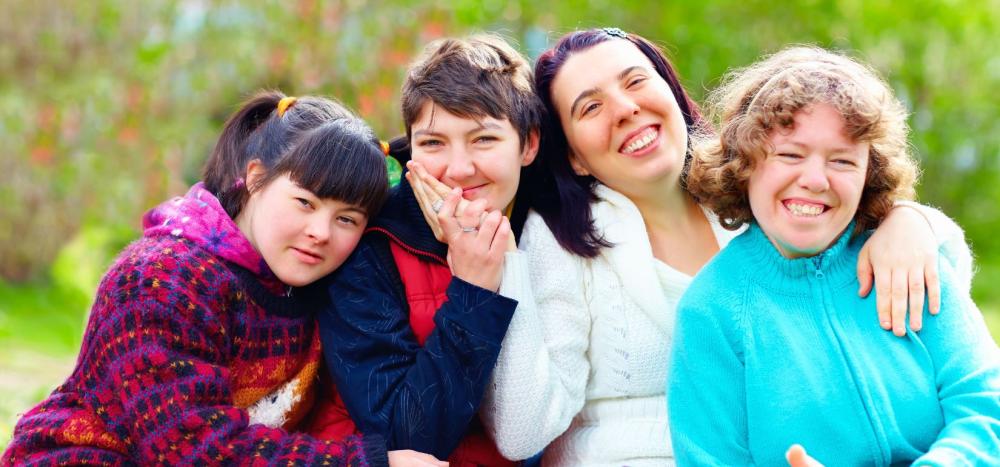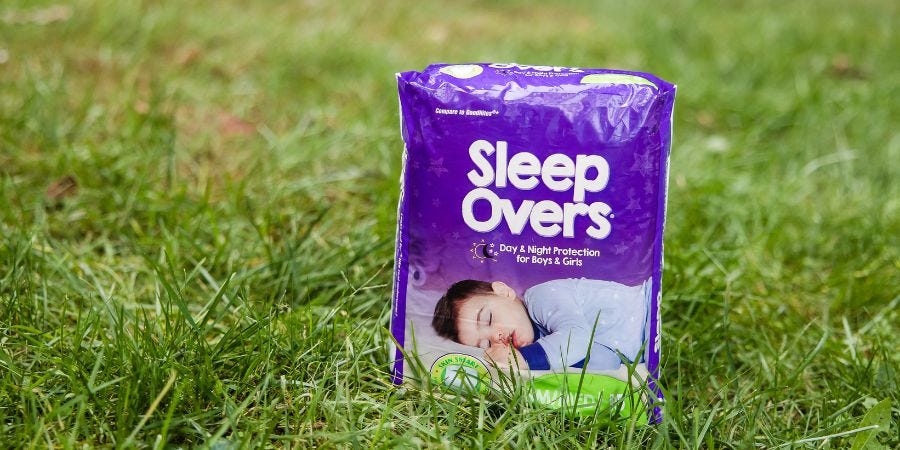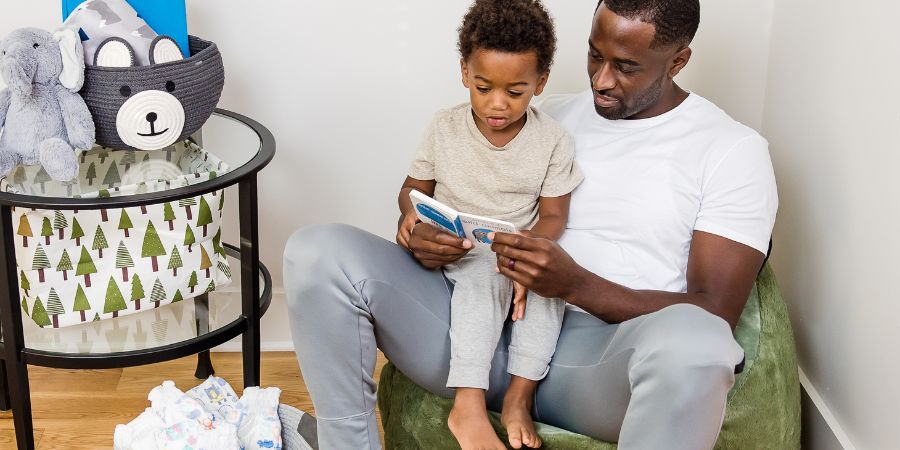This piece has been medically reviewed by Samantha Eaker DNP, CPNP-PC, Medical Advisor to Aeroflow Urology.
So, you’ve made it through the long potty training process. Both you and your child are feeling confident and proud, but now they’re having accidents. This is known as potty training regression and it can happen to any child of any age, but why?
If you’re one of the many caregivers searching for answers on how to recognize regression, why it’s happening, and what to do about it, look no further. We’ve asked our pediatric Medical Advisor, Samantha Eaker, for expert advice on the topic so you’ll know what to do!
Why Do Kids Regress?
After your loved one learns to use the toilet, they may begin to show signs of potty training regression, including:
- Refusing to use the toilet.
- Having accidents during the day or night.
- Wanting diapers.
Toilet training regression can happen to any child of any age, including children with special needs and certain medical conditions. There’s no typical age that kids experience regression; the cause is contingent on why regression is occurring or is related to the progression or changes in underlying diseases.
Check Your Eligibility
2 Easy Steps
Diapers and pull-ons for children ages 3+ with special needs, available through Medicaid.
Risk Factors & Causes
There are a variety of risk factors and causes that may be behind your child's regression.
- Stress and anxiety: Some children, such as those with sensory processing disorders or some with autism spectrum disorder (ASD), can fear the toilet, including the sound of flushing. This can cause stress / anxiety in children at any time.
- Distraction: Children with attention-hyper deficit disorder (ADHD) and children without may become distracted outside of the bathroom, ignoring their bodily urges that tell them it’s time to go.
- Change in routine: Changes in schedule or routine, like going to a new daycare or school, waking up or going to bed at different times, dietary changes, or any other alterations to daily life could cause regression.
- Changes in household: New siblings in the family, pregnancy, major sickness and / or loss of a family member, parental strife / divorce, and relocation to new housing may cause potty training regression.
- Infection: Infections like urinary tract infections (UTIs) may make it painful for children to urinate, deterring them from using the toilet.
- Constipation: Similar to UTIs, constipation may make pooping painful for children, causing them to avoid the bathroom.
- Structural abnormalities: Abnormalities, such as spinal abnormalities that lead to nerve damage can change or diminish the signals to and from the bladder, causing incontinence (loss of bladder or bowel control).
- Disabilities: Special needs (developmental delays, cerebral palsy (CP), autism, etc.) can make the toileting process difficult and may cause regression.
8 Expert Tips to Handle Potty Training Regression
Potty training children can be a tiring process for both caregivers and little ones, especially if you’re toilet training children with special needs. It can be frustrating when your child begins to show signs of regression, but there are ways to handle it. Use these expert tips from our Medical Advisor to get your kiddo back on the potty.
1. Identify the Cause.
Since there’s a multitude of things that can cause regression, it’s critical that you identify what’s causing your child to stop using the toilet. To find the cause of the regression, you should first see your loved one’s pediatrician to rule out any underlying causes that need treatment like UTIs.
2. Remain Calm.
Cleaning up after accidents, visiting doctors, and washing soiled clothing can all feel overwhelming after you’ve gone through the toileting process before. But try to stay calm and know that regression can happen to any child at any age.
3. Pay Attention to Bowel Movements.
The general goal is for children to have at least 1, soft bowel movement each day.


Watch out for the signs of constipation; it shouldn’t be painful for your child to go and their fecal matter should be shaped like a banana or sausage (formed, soft, no cracks). If they’re showing signs of pain or their waste doesn’t look healthy, the cause could be constipation. Talk to your child’s healthcare provider about easing their constipation.
4. Keep Routines Consistent.
Every family goes through changes they can’t control, whether it’s the unfortunate loss of a loved one or a move to a new home. While these things may be out of your control, do what you can to keep schedules and routines consistent. This may lessen your child's stress or anxiety that could have been brought on by change. If there are household changes that cannot be helped and your child isn’t adjusting well to, speak with their pediatrician about coping strategies.
5. Use Positive Reinforcement.
You should only use positive reinforcement during potty training regression (and the toilet training process in general). Never punish or reprimand your loved one for accidents. And try to avoid appearing disappointed which can put more stress on your child.
6. Encourage Timed Voiding.
Suggest that your child try to use the toilet every 1-2 hours. This can help prevent accidents and may help them work through some toileting fears if that’s the case. Timed bathroom use also reinforces a concrete schedule that can help make your child feel they’re in a routine.
7. Use a Reward System.
Depending on what your loved one responds to (stickers, special snacks, etc.), you can try using them as part of a reward system.
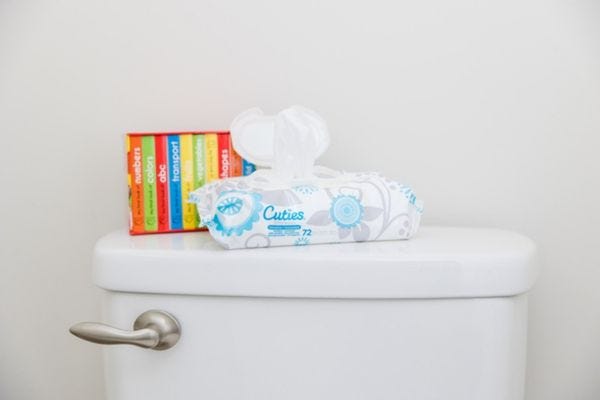

When they successfully use the toilet, you can offer the reward which may incentivize them to try in the future.
8. Communicate Expectations.
Without being discouraging, let your child know you expect them to start using the toilet again. You can also let them know you’ll be there for support and encouragement along the way!
What About Using Diapers Again?
When your child starts having accidents all over again, you may be questioning whether or not to put them in diapers to avoid soiling furniture, bedding, or clothes.
Yes, using diapers or pull-ups may lessen the work for you and the discomfort for your child, but it may not be the best idea. It really depends on your child’s individual needs and conditions.
Some healthcare providers discourage reversion to diapers or pull-ups, as they argue it may facilitate children continuing to have accidents instead of using the toilet. However, it’s also important to also take into consideration the impact the regression may have on the mental health of your child and you as a caregiver. If using diapers or pull-ups is more feasible during a regression, short-term use is reasonable until the cause of regression is identified and addressed. If you find your child is discouraged from using the toilet when back in toilet training products, try to put them back in underwear.
Also note that if your child has special needs or experiences a physical change, such as a spinal cord injury (SCI), in which case they may lose bowel and bladder control, diapers and pull-ups may be the answer.
Information provided on the Aeroflow Urology blog is not intended as a substitute to medical advice or care from a healthcare professional. Aeroflow recommends consulting your healthcare provider if you are experiencing medical issues relating to incontinence.

